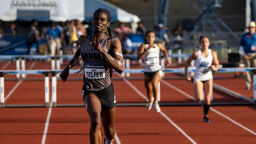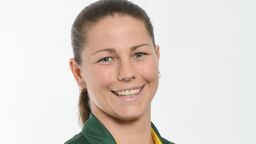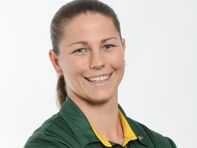In the last week, the world governing bodies of professional cycling and disc golf decided to write new rules for transgender athletes in the female category: When transgender women win, we reserve the right to deny your success, your identity and your humanity.
Union Cycliste Internationale announced that transgender women will have to compete in a “men’s/open” category and are barred from the female category. The catalyst behind was the recent success of Austin Killips. Since a breakthrough effort at last year’s USA Cycling Cyclocross Nationals and a cyclocross season in Europe, she took her show on the road to the Tour of the Gila in New Mexico in May.
The Disc Golf Pro Tour has shown much of the same anti-transness.
The running battle between that organization and transgender touring pro Natalie Ryan went from the course to the courtroom twice this season. The legal actions were in response to the Professional Disc Golf Association and the DGPT denying her a place in the Female Professional Open division after Ryan’s two event wins in 2022.
Then the Tour escalated the situation by cancelling the FPO division at five tournaments. Four of the tournaments affected are based in the U.S., along with one in Canada.
The common denominator? Each of those tournaments were held in areas that uphold transgender rights, and where Ryan stands a good chance of winning a court challenge.

DGPT CEO Jeff Spring cited “fairness” as the reason for the policy and changing the schedule, but Ryan didn’t buy any of it.
“If the concern is that cis women won’t earn as much money, the solution is not guaranteeing none of them will make any,” she said via Instagram. “This is not Natalie Ryan’s fault.”
The decision frustrated a trans pioneer in the sport. This past weekend Kelly Jenkins, the PDGA’s first out trans competitor, won her age division at PDGA Masters World Championships in Arizona.
The win for her was somewhat overshadowed by the actions of the DGPT to keep Ryan out of the women’s competition and brought back harsh memories navigating her own transition while living in a place where it wasn’t accepted.
“In Tennessee I was refused service in a restaurant because I’m trans and was asked to leave an LGBT bar for having the audacity to use the women’s restroom,” she continued. “We need politicians and lawmakers on our side to make sure all the states protect us leaving the DGPT nowhere to run.”
Both of these national and international governing bodies, as have FINA, World Athletics and many others who called for blanket bans, claim they are basing their policy on proof that their previous rules on limits to testosterone still yield an “unfair advantage” for transgender women in the female category.
Yet none of these organization will acknowledge research such as the 2022 report of the Canadian Center for Ethics in Sport or the newly published study by a group of Australian researchers led by noted endocrinologist Dr. Ada Cheung and athlete-advocate Kirsti Miller.
Their work goes even deeper in contesting the claims of “permanent insurmountable advantage” for transgender women in sports.
What seems to get the attention of the governing bodies? Those who have used transphobia as their post-sports retirement plan.
Consider the examples of former college swimmer Riley Gaines, who is building her name and brand demeaning Lia Thomas, or a cyclist Hannah Arensman, who contends finishing behind Killips at USA Cycling Cyclocross Nationals last year led her to retire.
Such talk gnaws at Killips’ coach, former professional racer and five-time national masters champion Adam Myerson.
“What upsets me most is that trans women are never allowed any agency,” he said. “Any success or failure they have is viewed through the lens of being trans only, ignoring any hard work or sacrifice or any of the thousands of things that go into sports performance.”
Myerson’s thoughts, and the hurt that comes with it, mirror my own. It’s a hurt that comes in part from being a trans person in a time when people debate, question or try to outlaw my existence.
Where exactly is the “fairness” in following every rule and then being held in contempt and under suspicion because you won?
Is it “fair” for me and mine to check our identity and humanity at the starting line? To quote two-time UCI track cycling champion Dr. Veronica Ivy via Instagram, “The UCI has said loud and clear that trans women are not real women and that we must be treated as other, and the cis women must be ‘protected’ from us innocent trans women. It’s an indignity. It’s inhumane. It’s disgusting.”
Valentina Petrillo, after three years of training hard and fighting her national federation for her chance to run fast, won two bronze medals at the World Para Athletic Championships last week.
Would it be “fair” for her to perhaps be held out of next year’s Paralympics because she is trans and fast enough to contend for a medal?

Austin Killips winning a bicycle race makes some folks uncomfortable. Natalie Ryan peering in the distance with the basket in sight and a 2-shot lead? Some people don’t like that.
If you don’t think it's a matter of discomfort, I’d invite you to read some of the comment sections on stories about their success, or what certain transphobes leave on the social media of these transgender athletes or any trans person.
How many times has a Killips, Ryan or any other trans woman in sports who succeeds been called “cheater,” misgendered willfully, or have to deal with certain creepy cisgender people speculating on their medical status and/or their genitalia? How exactly is this “fair”?
This isn’t a “fairness” issue, especially when fairness and humanity of me and mine are left out of the discussion. As a transgender people and as athletes we are tired of being the scapegoat for that discomfort.







































